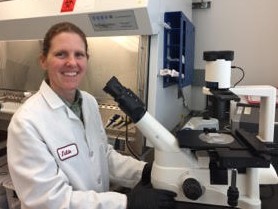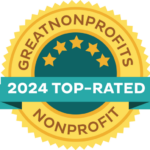On this #OMFScienceWednesday we want to introduce you to one of the extremely talented, dedicated researchers whose work OMF funds thanks to your generous support. We invited ME / CFS Collaborative Research Center at Stanford team member Julie Wilhelmy to share her background and role at the Stanford Genome Technology Center (SGTC). Julie wrote:

“As a recent graduate of Washington University in St. Louis, I started working at Stanford in 1999 with Ron Davis sequencing DNA for the Human Genome Project. After its completion in 2003, I joined the Inflammation and Host Response to Injury Program (http://www.gluegrant.org) studying the effects of severe systemic inflammation on trauma patients by examining the gene expression levels of various immune cell types at several time points post-injury.
Through a collaboration with Mark Davis, our group decided to focus on Human Leukocyte Antigen (HLA) profiling. As this region of the genome is highly variable and the products of these genes are a major factor in the human response to infection and in autoimmunity, it became evident that obtaining this information from patients with immune-related diseases would be very valuable so we developed a high throughput method to determine the sequence of these genes in many individuals (http://www.pnas.org/content/109/22/8676). In 2012, I left Stanford to work in industry, helping to launch a company, Cellular Research Inc., specializing in counting molecules for gene expression studies.
In 2016, I returned to Stanford to work on the SIPS study for ME / CFS, generating data to analyze the gene expression patterns of the severely ill patients. I also joined Mark Davis’s lab in immunology to set up a high throughput pipeline for the analysis of T Cell receptors and gene expression of single cells in his lab to research a number of different diseases. Due to the emergence of increasing amounts of evidence supporting the link between ME / CFS and immunology, we have decided to use this pipeline to examine the T Cell repertoires of our ME / CFS patients as well. In addition, we plan to gather and incorporate HLA sequencing of these same patients for a very comprehensive look at the immune response in ME / CFS.
I am involved in several other projects within our ME / CFS group including the Metabolic Trap Project with Robert Phair, the red blood cell work with Mohsen Nemat-Gorgani and Amit Saha. I work with Layla Cervantes to explore the energy metabolism of ME / CFS patient immune cells using the Seahorse instrument. We both also help support the Nanoneedle platform development with Rahim Esfandyarpour and Alex Kashi by providing patient and healthy cells for standard runs on the instrument as well experiments to further clarify our findings of increased impedance after salt stress in ME / CFS cells.
I’d like to take this opportunity to thank all of the patients who have provided blood samples to our lab so that we can look at the differences between patients and healthy controls with our methods. Some have even donated several times so that we can develop our tools to explore the mechanisms behind ME / CFS. This has been an invaluable resource which has allowed us to progress at a faster pace and we really appreciate the support we have been given by the patient community.
I have never had a chance to work in such proximity to the people affected by the disease I am studying and it has been an eye-opening experience that I will never forget along with the many friendships I have made over the last 2 years. Thanks again!”
Thank you, Julie, for your dedication and providing us a look behind the scenes.


